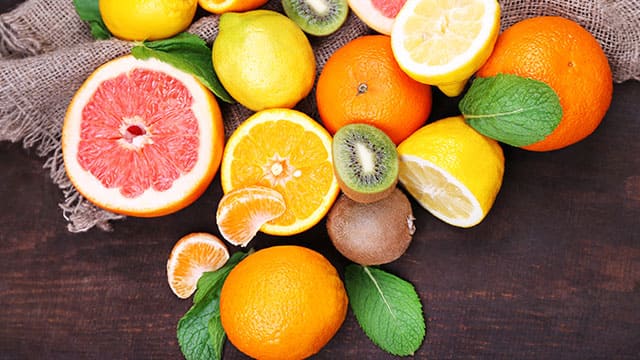The acid content of a food is measured according to its pH value. Foods with a pH above 7 are considered alkaline, per the United States Environmental Protection Agency (EPA), whereas those that are below 7 are acidic. And the lower the pH, the higher the level of acidity. Here are the 13 most acidic fruits and their pH value as observed by the Clemson University:
Lemon Juice (2.00 – 2.60)
Limes (2.00 - 2.80)
Blue Plums (2.80 – 3.40)
Grapes (2.90 – 3.82)
Pomegranates (2.93 – 3.20)
Grapefruits (3.00 – 3.75)
Blueberries (3.11 – 3.33)
Pineapples (3.20 – 4.00)
Apples (3.30 – 4.00)
Peaches (3.30 – 4.05)
Apricots (3.30-4.80)
Oranges (3.69 – 4.34)
Tomatoes (4.30 – 4.90)
The good news? You don't always have to eat these high-acidic fruits to get the vitamin C your body needs. Cantaloupe, for example, is one of the best natural sources of vitamin C, and with a higher pH (6.13 – 6.58) it's much less acidic than many other fruits with similar vitamin content. Honeydew melons, watermelon and bananas are also good choices for this reason. Just be aware that fruits in the form of juices, wine, jams and jellies – or when tinned or frozen – are still acidic in nature.
What Is Dental Erosion?As hard as tooth enamel is, the high acid content in many fruits and fruit juices can cause it to weaken and demineralise over time. These softened areas of enamel may then become discoloured, sensitive to extreme temperatures or even sweet foods, and eventually decay and need special types of repair. The calcium in saliva can help strengthen enamel, according to the Academy of General Dentistry (AGD), but when the environment in your mouth is too acidic, remineralisation will not occur.
Preventing Enamel ErosionYou don't have to give up fruit in order to prevent erosion. Here are a simple few tips to keep your teeth healthy while maintaining your vitamin C requirement:
- Never suck on lemons, limes or any highly acidic fruit. Putting these fruits against your teeth for any period of time is a sure way to soften the enamel on your teeth.
- Use a straw when drinking fruit juices. This keeps it from coming in direct contact with your teeth.
- Rinse with water after eating fruit to dilute the acids in your mouth, and wait at least 30 minutes before brushing to give your enamel time to resettle.
- Keep your enamel strong by brushing with fluoridated toothpaste.
- Eat cheese after your fruit. This raises the pH levels in your mouth and increases saliva production, which also helps neutralise acids. The AGD also holds that certain compounds in cheese adhere to tooth enamel, protecting it from various acids in your food.
Vitamin C plays a major role in the growth, maintenance and repair of your body's vital tissue. This includes your bones, cartilage and teeth. In fact, the United States National Library of Medicine suggests vitamin C keeps your body equipped to heal wounds and fight infections – gum disease included.
Your body cannot manufacture or store vitamin C by itself, though, so you need to get your daily requirement by eating foods that are rich with it. Vitamin C is found in all fruits and vegetables, but some of the best fruit sources are cantaloupe, citrus fruits like oranges and grapefruits, as well as kiwis, mangos, pineapples, watermelon and several types of berries.
Health professionals will always recommend eating a balanced diet with lots of fruits and vegetables so that you get enough vitamin C, as long as you take precautions to keep the most acidic fruits from hurting your teeth. This way, you can have your fruit and eat it too.
This article is intended to promote understanding of and knowledge about general oral health topics. It is not intended to be a substitute for professional advice, diagnosis or treatment. Always seek the advice of your dentist or other qualified healthcare provider with any questions you may have regarding a medical condition or treatment.
ORAL HEALTH QUIZ
What's behind your smile?
Take our Oral Health assessment to get the most from your oral care routine
ORAL HEALTH QUIZ
What's behind your smile?
Take our Oral Health assessment to get the most from your oral care routine













